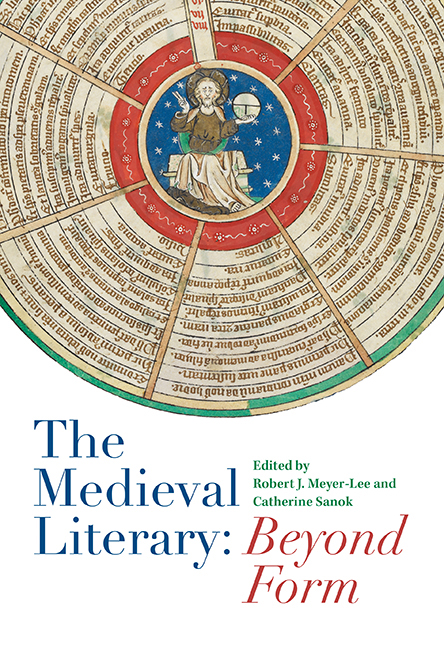Book contents
- Frontmatter
- Contents
- List of Illustrations
- Acknowledgments
- List of Contributors
- List of Abbreviations
- Introduction: The Literary through – or beyond? – Form
- I Instrumental Forms
- II Form Performed
- 4 Rhymed Alliterative Verse in Mise en page Transition: Two Case Studies in English Poetic Hybridity
- 5 Idiot Psalms: Sound, Style, and the Performance of the Literary in the Towneley Shepherds’ Plays
- 6 Inaudible Music
- III Temporalities of Form
- Index
6 - Inaudible Music
from II - Form Performed
Published online by Cambridge University Press: 12 October 2019
- Frontmatter
- Contents
- List of Illustrations
- Acknowledgments
- List of Contributors
- List of Abbreviations
- Introduction: The Literary through – or beyond? – Form
- I Instrumental Forms
- II Form Performed
- 4 Rhymed Alliterative Verse in Mise en page Transition: Two Case Studies in English Poetic Hybridity
- 5 Idiot Psalms: Sound, Style, and the Performance of the Literary in the Towneley Shepherds’ Plays
- 6 Inaudible Music
- III Temporalities of Form
- Index
Summary
Spreading out from the lantern-covered oculus in the octagonal dome of the Florence baptistery of San Giovanni, a detailed iconographic program curves down and away from a circular glimpse of light. Some critics suggest that the arrangement of these mosaics bears a resemblance to and perhaps even provides inspiration for the concentrically arranged cosmos of Dante's Comedy, beginning with the hierarchy of angels ringing the circle of light and followed by scriptural episodes, including Judgment Day and its organization of souls. If this is the case, then the oculus-framed light would have occupied the place where, in Dante's poem, representation would seem to end. When Dante approaches this limit in the Paradiso – or when his poetry retrospectively recalls it – he stages several attempts at describing the experience. Gazing upon “la luce etterna” (the Eternal Light), he remembers perceiving “un volume” (one single volume) containing all parts of the universe bound together; he thinks that he saw “la forma universal di questo nodo” (the universal shape / which that knot takes); and he describes three circles in which “la nostra effige” (our effigy) seemed to reside. But he struggles to understand that vision, even within the moment of encounter, and he admits to offering only a diluted memory of it in the fictive aftermath, or the timeframe of his writing; words, he claims, are too weak to communicate the experience of rapture.
The final tercets of the Paradiso thus intimate an extraordinary, extra-linguistic experience at the end of a long poetic journey, announcing, and seemingly causing, the end of that work. In the intensity of the moment – at the cusp of poetic finality and at the edge of linguistic capacity – Dante employs specificity and certainty only to articulate how language inevitably founders in the effort to capture the encounter at the furthest extent of the firmament, perhaps just before the face of God. Although he has described in abundant, richly metaphoric detail the rings of the damned, the circling terraces of the penitent, the spheres of the blessed, and the orders of angels, when he arrives at this new kind of light, the pilgrim-poet insists that verse must edge around its unspeakable inspiration, carefully skirting the light beyond articulation as the planets whirl around that same central point and cause.
- Type
- Chapter
- Information
- The Medieval Literary: Beyond Form , pp. 141 - 158Publisher: Boydell & BrewerPrint publication year: 2018



